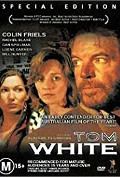
Directed by
Alkinos Tsilimidos
106 minutes
Rated M
Reviewed by
Bernard Hemingway

Tom White
Synopsis: Tom White (Colin Friels) lives a seemingly “normal” life with a wife (Rachel Blake), two young kids and a steady job as a draftsman. One day at work, after discovering he has been passed over for a younger employee, he flips out, gets ragingly drunk and meets up with a young male hooker, Matt (Dan Spielman), who offers him a place to crash for the night. From there Tom drifts into homelessness, sharing his life for nearly two years with an underclass who live in a world totally unfamiliar to his prior life.
The strength of Tom White is its acting. Dan Spielman gives Matt a softness but with a self destructive edge; Leone Carmen is a touching Christine, a sideshow worker trying to extricate herself from a world of prostitution, drugs and her ex-dealer (David Field); Jarrad Jinks is Jet, a teenage who lives with his small-time criminal father, while veteran Antipodean actor Bill Hunter gives an imposing performance as Malcolm, self-anointed lord of the streets and mentor to Tom in the art of homeless living. Rachel Blake as Tom’s wife draws a fine line between repressed emotion and at times such coldness as to perhaps explain why Tom ran away from home.
Director Alkinos Tsilimidos draws honest performances with little sentimentality from all of his cast. Centre-stage, Colin Friels’s performance is terrific: the sort often referred to as “brave”, perhaps because he is so physically immersed in the role. From his initial “Mr Average” wage earner/husband/Dad persona, he unravels to a condition of filthy dishevelment, but, underscored by a reawakened spirit, apparently enriched to have finally broken the shackles of mediocrity and discovered life unshored by the safeguards of conformism. Along the way he discovers new people to share his journey and intimacy with for a short time, and sees that “home is what you love” rather than a definition imposed by society.
For me there were some problems with the dialogue, which at times is a little histrionic and so falls short of believable; at other times it proffers little pearls of wisdom albeit in an overly-staged manner. This perhaps derives from the screen-writer Daniel Keene drawing on some of his short plays to construct the script. One of the film’s central conceits, that of identity, is also a little laboured at times.
Much of the film was shot at night which contributes to the ever-present sense of isolation in the grotty alleys and shabby dwellings in which the characters so often find themselves. Seeing Melbourne writ large upon the screen is always a buzz, and good use is made of exteriors to emphasise a sense of alienation.
The arc of Tom’s journey leads him through rage, emotional numbness, grief, isolation, connection, and finally to compassion and a confrontation with his own self-worth. It is the sense of compassion for all the characters that is one of the film’s major strengths. How often have we passed people in the street and wondered what happened in their lives to lead them to this situation? Although there are no hard and fast answers, Tom White gives us an insight, and reminds us of all people’s common humanity rather than their surface differences.
The film features a beautiful, sympathetic score by Paul Kelly with a haunting song Meet Me in the Middle of the Air which draws heavily upon the 23rd Psalm.
Want something different?





